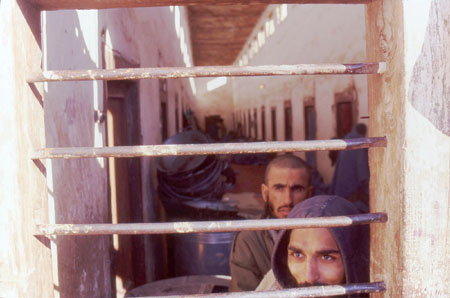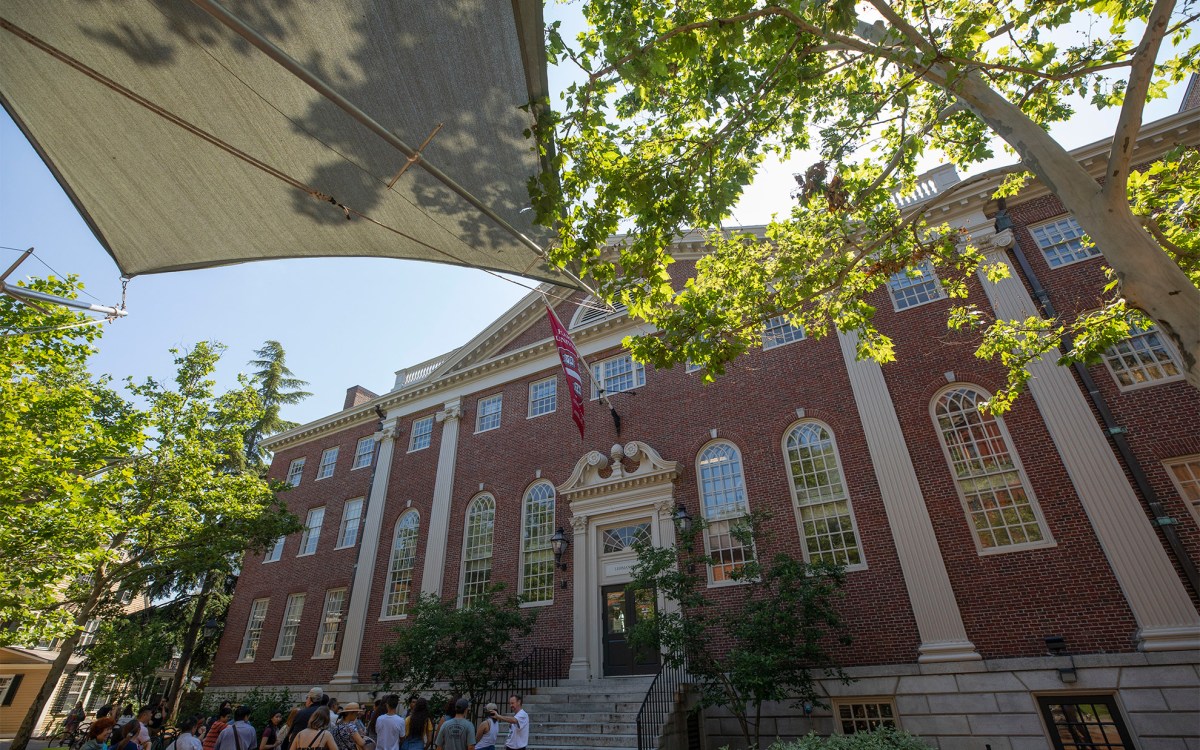School of Public Health professor visits Taliban prisoners
Leaning calls for U.S. intervention, aid after inspection trip

The plight of the men, captured Taliban fighters held in Shebarghan Prison near Mazar-I-Sharif, attracted an investigation team in January from the nonprofit Physicians for Human Rights (PHR). While the investigators found no evidence that the men were being tortured or intentionally mistreated, they also found that the crowded conditions and lack of resources were killing them just as surely as a firing squad.
“These men are going to die in large numbers if more supplies aren’t (found),” said Jennifer Leaning, professor of international health in the School of Public Health’s Department of Population and International Health. “We think there’s a possible catastrophe here.”
Leaning, a member of the three-person investigation team and one of Physicians for Human Rights’ founders, said she believes the U.S. government shares responsibility for the care of these men. As a partner in their capture in the northern Afghan city of Kunduz, and as at least temporary administrators of the prison itself, Leaning said the United States has a legal obligation under international law to provide adequate food, shelter, and medical care.
It is already too late for an unknown number of prisoners. The prison commander, General Jarobak, told Leaning that many have already died. He told her he had asked the international community for more food, clothing, and funds to dig a deep well for cleaner water. Despite those requests, he told her, nothing has changed.
“He said ‘many, many, many’ died – three ‘manys,’” Leaning said. “He kept them in as good condition as he could, but it’s wholly inadequate. In his view, the men are getting visibly weaker.”
The Shebarghan Prison visit was the most dramatic stop on the trip, which began Jan. 7 and ended Jan. 23. Leaning and her two associates, John Heffernan, a consultant to PHR and former executive director of the Coalition for International Justice, and Lynn Amowitz, a specialist in women’s health and human rights, began the trip by spending a week consulting with officials in Kabul. Their overall aim was to gather information so PHR officials could design future missions to the war-torn nation.
Along with an Afghan driver and a translator, Leaning and Heffernan left Kabul after the first week, wanting to see conditions firsthand in the northern part of the country around Mazar-I-Sharif. They hoped to inspect hospitals in Mazar-I-Sharif, and get a general assessment of the economic condition of the region. But they particularly wanted to visit Shebarghan, which had figured in some media reports as a holding place for captured Taliban fighters, in order to assess the prisoners’ condition.
It took a day and a half to make the roughly 400-kilometer trip which led through the just reopened Salang Tunnel – a kilometer and a half long with only the car’s headlights to guide them. The tunnel burrows beneath the top of a mountain on the main north-south route from Kabul to Mazar-I-Sharif. Leaning said the fierceness of the recent decades’ fighting in the region was apparent from the burned-out hulks of tanks and armored personnel carriers sitting on the side of the road.
Some places where there had historically been fields and agriculture, such as the plains north of Kabul, were abandoned. The party stopped for the night in a small town just north of the Salang Tunnel out of fear of bandits or of a mishap such as an auto accident that could strand travelers far from help.
Despite the desolation and fear, Leaning said she sensed a tenacious hope among the Afghans she encountered. The people’s entrepreneurial spirit was evidenced by the lively markets, stores, and shops where worn-out machinery was given new life.
After visiting hospitals and health-care facilities in Mazar-I-Sharif, the group secured permission to travel to the town of Sherbarghan, about an hour and a half west. Leaning said they drove through the town and, though their papers didn’t specifically give them permission to visit the prison, they drove up and asked to be let inside.
Identifying themselves as doctors, they spoke to General Jarobak outside the prison gate and convinced him that if they could document the need there, they might be able to do something. He agreed and led them on a tour of the facility.
Sherbarghan prison consists of three long cellblocks, an infirmary, and offices for prison administrators. Prison windows are barred but open to the air. The day Leaning and the others visited it was 40 degrees and sunny, but a stiff breeze blew right through the prison complex. The cells were originally built to house 10 to 15 men, but that day held 80 to 110 each. Leaning said they directly observed about 300 of the prisoners, who gathered around the windows and doors as the group toured. The men appeared to have lost weight and complained of dysentery, of poor and inadequate food, and of the cold. One man commented that he wouldn’t keep his animals in conditions such as these, Leaning said.
They also visited the small infirmary and interviewed the eight listless men there, some suffering from wounds and others from dysentery. Leaning, an attending physician at Brigham and Women’s Hospital’s Department of Emergency Medicine, said she would guess that four of the eight were critically ill.
The Physicians for Human Rights’ message, outlined in a report and at a news conference in Washington, D.C., on Jan. 28, is pretty straightforward, Leaning said. They believe the United States, as a party to the coalition war against the Taliban and as the party that controlled access to Sherbarghan for a time in January as prisoners were interrogated, has a responsibility under international law to ensure the prisoners are treated humanely. That responsibility, they said, hasn’t lessened because responsibility was transferred to the Afghan government.
In addition to that, Leaning said, it is essential that the United States and other involved nations provide adequate security so that parts of the country don’t fall into lawlessness and banditry. The Afghan people need security, she said, and they need funds for public works projects to help get the economy going again.
“We got a pretty good sense of the spirit of the people in the urban areas and at professional levels and that spirit is surprisingly optimistic and enterprising,” Leaning said.
Leaning said the group has already met with officials in the State Department, the Pentagon, and some congressional staff members and plans additional meetings. They should know within the next few weeks the impact of their visit and subsequent report.
“These people, underneath the hope, are exhausted and drained,” Leaning said. “To provide help now is a sound and steady way to build a friendly, very interesting, self-reliant nation. It would be a tragedy if we let this opportunity slip through our grasp.”




